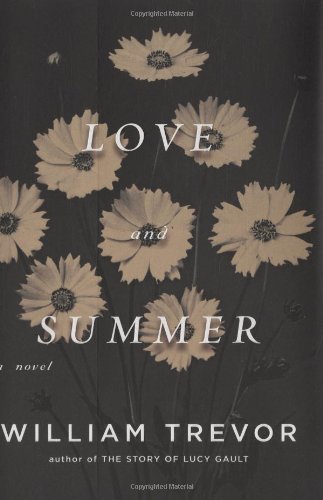At the beginning of the year, we noted that “2009 may be a great year for books.” With the publishing schedule for the remainder of the year filled out, calling 2009 a great year for readers is now a certainty. If anything, 2009 is backloaded, with new titles coming in the second half of the year from legends like Thomas Pynchon and Philip Roth and fan favorites like Lorrie Moore and Jonathan Lethem. A peek into 2010, meanwhile, reveals more literary excitement on tap, with new titles on the way from Jonathan Franzen, Joshua Ferris, and others. Below you’ll find, in chronological order, the titles we’re most looking forward to right now. (Special thanks to the illustrious members of The Millions Facebook group who let us know what they are looking forward to. Not everyone’s suggestions made our list, but we appreciated hearing about all of them.)
 In July, Dave Eggers continues the trend he started with What is the What, working closely with his subject to produce a work with elements of memoir and non-fiction. In Zeitoun, the subject is Abdulrahman Zeitoun, “a prosperous Syrian-American and father of four,” who lived in New Orleans and disappeared in the aftermath of Hurricane Katrina. A few weeks ago, The Rumpus ran a long interview with Eggers that touches on Zeitoun, among several other topics. Eggers first encountered Zeitoun when McSweeney’s put out Voices from the Storm, an oral history of Katrina, and he told The Rumpus, “Their story intrigued me from the start, given that it’s at the intersection of so many issues in recent American life: the debacle of the government response to Katrina, the struggles facing even the most successful immigrants, a judicial system in need of repair, the problem of wrongful conviction, the paranoia wrought by the War on Terror, widespread Islamophobia.” (Scroll down to October for more “Anticipated” action from Eggers.)
In July, Dave Eggers continues the trend he started with What is the What, working closely with his subject to produce a work with elements of memoir and non-fiction. In Zeitoun, the subject is Abdulrahman Zeitoun, “a prosperous Syrian-American and father of four,” who lived in New Orleans and disappeared in the aftermath of Hurricane Katrina. A few weeks ago, The Rumpus ran a long interview with Eggers that touches on Zeitoun, among several other topics. Eggers first encountered Zeitoun when McSweeney’s put out Voices from the Storm, an oral history of Katrina, and he told The Rumpus, “Their story intrigued me from the start, given that it’s at the intersection of so many issues in recent American life: the debacle of the government response to Katrina, the struggles facing even the most successful immigrants, a judicial system in need of repair, the problem of wrongful conviction, the paranoia wrought by the War on Terror, widespread Islamophobia.” (Scroll down to October for more “Anticipated” action from Eggers.)
 William T. Vollmann is known for his superhuman writing output, but his forthcoming book Imperial is a monster, even for him. Weighing in at 1,296 pages and carrying a list price of $55, this work of non-fiction is “an epic study,” in the words of the publisher, of Imperial County, California along the U.S.-Mexico border. Ed offers quite a bit more discussion of the book. Don’t miss the comments, where it’s said that Vollmann has called the book “his Moby-Dick.”
William T. Vollmann is known for his superhuman writing output, but his forthcoming book Imperial is a monster, even for him. Weighing in at 1,296 pages and carrying a list price of $55, this work of non-fiction is “an epic study,” in the words of the publisher, of Imperial County, California along the U.S.-Mexico border. Ed offers quite a bit more discussion of the book. Don’t miss the comments, where it’s said that Vollmann has called the book “his Moby-Dick.”
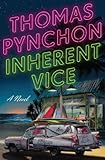 August kicks off with what will no doubt be a peculiar literary event, the publication of Thomas Pynchon’s Inherent Vice. It is a rare thing these days when a flurry of media attention centers on someone who has no interest in basking in it. And so, perhaps as Pynchon intends, the focus will be on the book. Inherent Vice promises to be odd. It’s 416 pages, shorter than the typical Pynchon doorstop, and the publisher Penguin, in its catalog, notes that Pynchon is “working in an unaccustomed genre” this time around. “Genre” seems to be the buzzword here. The book sports neon cover art and follows a private eye (Doc Sportello). The book begins: “She came along the alley and up the back steps the way she always used to.” Review copies are already out, and the early word is that the novel overlaps somewhat with and bears some similarities to Vineland.
August kicks off with what will no doubt be a peculiar literary event, the publication of Thomas Pynchon’s Inherent Vice. It is a rare thing these days when a flurry of media attention centers on someone who has no interest in basking in it. And so, perhaps as Pynchon intends, the focus will be on the book. Inherent Vice promises to be odd. It’s 416 pages, shorter than the typical Pynchon doorstop, and the publisher Penguin, in its catalog, notes that Pynchon is “working in an unaccustomed genre” this time around. “Genre” seems to be the buzzword here. The book sports neon cover art and follows a private eye (Doc Sportello). The book begins: “She came along the alley and up the back steps the way she always used to.” Review copies are already out, and the early word is that the novel overlaps somewhat with and bears some similarities to Vineland.
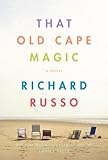 Inherent Vice shares a release date with a new book by Richard Russo, That Old Cape Magic, which Entertainment Weekly has already called “very beach-y.” (Sadly, it appears to have come in last in their poll to determine the “Must book of the summer.”) It sounds like fairly standard “suburban malaise” fare in which a mid-life crisis is endured over the course of the summer, the upside for the reader being that Russo is bringing his considerable skills to the table. PW is fairly tepid on the book, “Though Russo can write gorgeous sentences and some situations are amazingly rendered… the navel-gazing interior monologues that constitute much of the novel lack the punch of Russo’s earlier work.”
Inherent Vice shares a release date with a new book by Richard Russo, That Old Cape Magic, which Entertainment Weekly has already called “very beach-y.” (Sadly, it appears to have come in last in their poll to determine the “Must book of the summer.”) It sounds like fairly standard “suburban malaise” fare in which a mid-life crisis is endured over the course of the summer, the upside for the reader being that Russo is bringing his considerable skills to the table. PW is fairly tepid on the book, “Though Russo can write gorgeous sentences and some situations are amazingly rendered… the navel-gazing interior monologues that constitute much of the novel lack the punch of Russo’s earlier work.”
 Of Roberto Bolaño’s forthcoming, newly translated novels, Millions contributor Lydia writes: “I almost never know about the hot, up-and-coming items, but I do happen to know about this one, and I feel that, like many readers, my relationship to Bolaño has been one of breathless anticipation since the moment I first heard his name. Which was like this: at my old job, I was going through the mail. There was a New Directions catalog of aforementioned hot, up-and-coming items. I haven’t historically had a lot of interest in contemporary trade publications, but New Directions has a very warm spot in my heart because I associate it with The Berlin Stories. Anyway, in said mag I read a blurb about Nazi Literature in the Americas, and thought it sounded really neat, and then learned I would have to wait a year to read it, and since then it feels like there’s been a lot of waiting – sometimes with glorious gratification at the end (2666), sometimes not (Nazi Literature in the Americas, ironically). It’s thrilling that they keep coming! The Skating Rink in August, Monsieur Pain in 2010. It’s like new the James Bond franchise (btw, I’m a Craig, not a Brosnan). I just love having something to look forward to. I hope I don’t wet my pants on the way to the bookstore.” (Bolaño fans will also be looking out for Melville House’s Bolaño: The Last Interview And Other Conversations)
Of Roberto Bolaño’s forthcoming, newly translated novels, Millions contributor Lydia writes: “I almost never know about the hot, up-and-coming items, but I do happen to know about this one, and I feel that, like many readers, my relationship to Bolaño has been one of breathless anticipation since the moment I first heard his name. Which was like this: at my old job, I was going through the mail. There was a New Directions catalog of aforementioned hot, up-and-coming items. I haven’t historically had a lot of interest in contemporary trade publications, but New Directions has a very warm spot in my heart because I associate it with The Berlin Stories. Anyway, in said mag I read a blurb about Nazi Literature in the Americas, and thought it sounded really neat, and then learned I would have to wait a year to read it, and since then it feels like there’s been a lot of waiting – sometimes with glorious gratification at the end (2666), sometimes not (Nazi Literature in the Americas, ironically). It’s thrilling that they keep coming! The Skating Rink in August, Monsieur Pain in 2010. It’s like new the James Bond franchise (btw, I’m a Craig, not a Brosnan). I just love having something to look forward to. I hope I don’t wet my pants on the way to the bookstore.” (Bolaño fans will also be looking out for Melville House’s Bolaño: The Last Interview And Other Conversations)
Dan Chaon’s Await Your Reply returns to the territory of separated siblings (You Remind Me of Me looked at a pair of long-lost brothers.) This time, the focus is on twins, one of whom has been missing for ten years. The book garnered a blurb from Jonathan Franzen, who will appear later in this list and who says of Chaon’s book, “I’ve been waiting for somebody to write the essential identity-theft novel, and I’m very glad Dan Chaon’s the one to have done it”
Let’s just get this out of the way: In September, you are going to hear a lot about Dan Brown’s The Lost Symbol.
 More importantly, we’ll get Richard Powers’ follow up to his award-winning novel The Echo Maker. In Generosity: An Enhancement, Powers explores the idea of patenting the human gene for happiness. Last year, Powers wrote about the human genome for GQ. There’s not a lot of info available about this one but Ed Champion writes he “foresee(s) some animosity from the vanilla critics hostile to idea-driven novels,” and Sarah Weinman “tweeted,” “Richard Powers’ new novel Generosity is about as audacious as a novel gets, and has fucked with my head as a reader every which way.”
More importantly, we’ll get Richard Powers’ follow up to his award-winning novel The Echo Maker. In Generosity: An Enhancement, Powers explores the idea of patenting the human gene for happiness. Last year, Powers wrote about the human genome for GQ. There’s not a lot of info available about this one but Ed Champion writes he “foresee(s) some animosity from the vanilla critics hostile to idea-driven novels,” and Sarah Weinman “tweeted,” “Richard Powers’ new novel Generosity is about as audacious as a novel gets, and has fucked with my head as a reader every which way.”
 Lorrie Moore is set to deliver her first novel in over a decade, A Gate at the Stairs. All those Moore fans out there are faced with a huge dilemma this week. Do they read the “Childcare,” the excerpt of the novel that is the fiction offering in this week’s New Yorker, or do they avoid the magazine and hold out for two more months until the novel comes out? We’ve never been big fans of the New Yorker’s packaging of novel excerpts as short stories, so to all the Moore fans out there, we say – avert your eyes when you reach page 70 of this week’s issue!
Lorrie Moore is set to deliver her first novel in over a decade, A Gate at the Stairs. All those Moore fans out there are faced with a huge dilemma this week. Do they read the “Childcare,” the excerpt of the novel that is the fiction offering in this week’s New Yorker, or do they avoid the magazine and hold out for two more months until the novel comes out? We’ve never been big fans of the New Yorker’s packaging of novel excerpts as short stories, so to all the Moore fans out there, we say – avert your eyes when you reach page 70 of this week’s issue!
 Kazuo Ishiguro’s Nocturnes: Five Stories of Music and Nightfall is already out in much of the rest of the English-speaking world. In The Guardian, Christopher Taylor described the book as “a carefully arranged sequence of interlocking stories” and said, “while many of the stories hinge on artistic talent – the risks and unkindnesses associated with it; who’s got it and who hasn’t – the strong focus on more widespread problems in life makes Nocturnes more than a writer’s thoughts on his job.” The Complete Review rounds up the rest of the early reactions.
Kazuo Ishiguro’s Nocturnes: Five Stories of Music and Nightfall is already out in much of the rest of the English-speaking world. In The Guardian, Christopher Taylor described the book as “a carefully arranged sequence of interlocking stories” and said, “while many of the stories hinge on artistic talent – the risks and unkindnesses associated with it; who’s got it and who hasn’t – the strong focus on more widespread problems in life makes Nocturnes more than a writer’s thoughts on his job.” The Complete Review rounds up the rest of the early reactions.
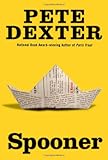 Pete Dexter returns in September with Spooner. This one sounds like another dark, Southern tale not unlike Paris Trout, the book that first put Dexter on the fiction map. The first line of Spooner is “Spooner was born a few minutes previous to daybreak in the historic, honeysuckled little town of Milledgeville, Georgia, in a make-shift delivery room put together in the waiting area of the medical offices of Dr. Emil Wood.”
Pete Dexter returns in September with Spooner. This one sounds like another dark, Southern tale not unlike Paris Trout, the book that first put Dexter on the fiction map. The first line of Spooner is “Spooner was born a few minutes previous to daybreak in the historic, honeysuckled little town of Milledgeville, Georgia, in a make-shift delivery room put together in the waiting area of the medical offices of Dr. Emil Wood.”
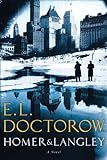 We’ll also get a new novel from E.L. Doctorow about a pair of brothers. Homer & Langley is about Homer and Langley Collyer, two famous Manhattan hoarders and recluses, who, after gaining notoriety for their obsessive habits and reportedly booby-trapped home, were found dead in 1947 surrounded by, according to Wikipedia, “over 100 tons of rubbish that they had amassed over several decades.” Newsweek has an excerpt of the book. The novel’s first line is “I’m Homer, the blind brother. I didn’t lose my sight all at once, it was like the movies, a slow fade-out.”
We’ll also get a new novel from E.L. Doctorow about a pair of brothers. Homer & Langley is about Homer and Langley Collyer, two famous Manhattan hoarders and recluses, who, after gaining notoriety for their obsessive habits and reportedly booby-trapped home, were found dead in 1947 surrounded by, according to Wikipedia, “over 100 tons of rubbish that they had amassed over several decades.” Newsweek has an excerpt of the book. The novel’s first line is “I’m Homer, the blind brother. I didn’t lose my sight all at once, it was like the movies, a slow fade-out.”
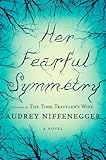 Dan Brown is no doubt getting serious bank for his return to airport bookshelves and grocery store check-out lines, but he’s not the only one having a great recession. Audrey Niffenegger reportedly took home a $5 million advance for Her Fearful Symmetry, her follow-up to her very popular The Time Traveler’s Wife. Niffenegger describes the book on her website: “The novel concerns a pair of mirror-image twins, Julia and Valentina Poole… Julia and Valentina are inseparable, and function almost as one being, although in temperament they are opposites.”
Dan Brown is no doubt getting serious bank for his return to airport bookshelves and grocery store check-out lines, but he’s not the only one having a great recession. Audrey Niffenegger reportedly took home a $5 million advance for Her Fearful Symmetry, her follow-up to her very popular The Time Traveler’s Wife. Niffenegger describes the book on her website: “The novel concerns a pair of mirror-image twins, Julia and Valentina Poole… Julia and Valentina are inseparable, and function almost as one being, although in temperament they are opposites.”
 Acclaimed novelist Margaret Atwood will have a new novel out in September called The Year of the Flood, which has been described as “a journey to the end of the world.” The Random House catalog, meanwhile, called it a “dystopic masterpiece and a testament to her visionary power.” If that all isn’t intriguing enough, it appears that the book is maybe (or maybe not) the second book in a trilogy that was kicked off with Oryx & Crake. Atwood and her publishers have offered mixed signals on the trilogy question. Quill & Quire looked into the question, and included a quote from Atwood saying, “It’s not a sequel and it’s not a prequel… It’s a simultaneouel.” Ah, one of those.
Acclaimed novelist Margaret Atwood will have a new novel out in September called The Year of the Flood, which has been described as “a journey to the end of the world.” The Random House catalog, meanwhile, called it a “dystopic masterpiece and a testament to her visionary power.” If that all isn’t intriguing enough, it appears that the book is maybe (or maybe not) the second book in a trilogy that was kicked off with Oryx & Crake. Atwood and her publishers have offered mixed signals on the trilogy question. Quill & Quire looked into the question, and included a quote from Atwood saying, “It’s not a sequel and it’s not a prequel… It’s a simultaneouel.” Ah, one of those.
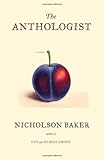 In The Anthologist, Nicholson Baker covers well-trod literary ground by focusing on a writer protagonist. However, PW gave the book a starred review, calling it “lovely” and saying “Baker pulls off an original and touching story, demonstrating his remarkable writing ability while putting it under a microscope.” Baker’s protagonist is Paul Chowder, who is tasked with writing an introduction for a poet friend’s anthology and delivers the book’s stream of consciousness narration. By all early accounts the book is quite funny and also deeply immersed in poetry, with digressions on a number of history’s great poets. The Simon & Schuster catalog calls the book a “beguiling love story about poetry.”
In The Anthologist, Nicholson Baker covers well-trod literary ground by focusing on a writer protagonist. However, PW gave the book a starred review, calling it “lovely” and saying “Baker pulls off an original and touching story, demonstrating his remarkable writing ability while putting it under a microscope.” Baker’s protagonist is Paul Chowder, who is tasked with writing an introduction for a poet friend’s anthology and delivers the book’s stream of consciousness narration. By all early accounts the book is quite funny and also deeply immersed in poetry, with digressions on a number of history’s great poets. The Simon & Schuster catalog calls the book a “beguiling love story about poetry.”
 It’s my feeling that John Irving’s fiction has fallen off quite a bit in recent years (the last really good read for me was A Son of the Circus), but I still keep an eye on Irving’s new novels for any sign that he has regained his early career mojo. His last several books haven’t tempted me, and it’s probably too early to tell whether the Last Night in Twisted River will. Reading the first sentence of the publisher’s description, we already find a couple of Irving’s authorial tics, New Hampshire and bears: “In 1954, in the cookhouse of a logging and sawmill settlement in northern New Hampshire, an anxious twelve-year-old boy mistakes the local constable’s girlfriend for a bear.” Don’t be surprised if a wrestler figures into the action somewhere in there. Still, Irving has compared the new book to The Cider House Rules. That’s a good sign.
It’s my feeling that John Irving’s fiction has fallen off quite a bit in recent years (the last really good read for me was A Son of the Circus), but I still keep an eye on Irving’s new novels for any sign that he has regained his early career mojo. His last several books haven’t tempted me, and it’s probably too early to tell whether the Last Night in Twisted River will. Reading the first sentence of the publisher’s description, we already find a couple of Irving’s authorial tics, New Hampshire and bears: “In 1954, in the cookhouse of a logging and sawmill settlement in northern New Hampshire, an anxious twelve-year-old boy mistakes the local constable’s girlfriend for a bear.” Don’t be surprised if a wrestler figures into the action somewhere in there. Still, Irving has compared the new book to The Cider House Rules. That’s a good sign.
The venerable William Trevor will have a new novel out, Love and Summer.
Millions reader Matthew looks forward to Laird Hunt’s Ray of the Star, due in September, “because Laird’s novels are fantastic.” Of Kamby Bolongo Mean River by Robert Lopez, he writes “This is his sophomore novel; his first, Part of the World was bizarre and funny.” He plans to read The Museum of Eterna’s Novel by Macedonio Fernandez (arriving in 2010) “because Borges sez so.”

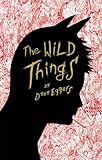 October is sure to bring Wild Things mania and Dave Eggers is going to be right in the middle of it. He worked with Spike Jonze on the film version of Where the Wild Things Are. And, in what is sure to be the most literary novelization of a film (adapted from a children’s book) ever, an Eggers-penned version of Wild Things is set to hit shelves when the movie comes out. There’s also the fur-covered edition.
October is sure to bring Wild Things mania and Dave Eggers is going to be right in the middle of it. He worked with Spike Jonze on the film version of Where the Wild Things Are. And, in what is sure to be the most literary novelization of a film (adapted from a children’s book) ever, an Eggers-penned version of Wild Things is set to hit shelves when the movie comes out. There’s also the fur-covered edition.
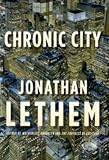 New Yorker readers have already gotten a taste of Jonathan Lethem’s forthcoming book Chronic City. Of the excerpt, packaged as the story “Lostronaut,” I wrote, “This story was pretty awesome. It was the only speculative fiction to land in The New Yorker this year, not quite making up for the absence of Murakami and Saunders from the magazine’s pages. This story is told in the form of letters from Janice, a ‘Lostronaut’ aboard some sort of space station, to her ‘Dearest Chase.’ She and her fellow astronauts are trapped in orbit by Chinese space mines and that’s not even the worst of it for poor Janice. While the premise and epistolary style are intriguing, Janice’s unique, irrepressible voice really carries the story.”
New Yorker readers have already gotten a taste of Jonathan Lethem’s forthcoming book Chronic City. Of the excerpt, packaged as the story “Lostronaut,” I wrote, “This story was pretty awesome. It was the only speculative fiction to land in The New Yorker this year, not quite making up for the absence of Murakami and Saunders from the magazine’s pages. This story is told in the form of letters from Janice, a ‘Lostronaut’ aboard some sort of space station, to her ‘Dearest Chase.’ She and her fellow astronauts are trapped in orbit by Chinese space mines and that’s not even the worst of it for poor Janice. While the premise and epistolary style are intriguing, Janice’s unique, irrepressible voice really carries the story.”
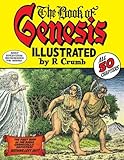 Readers are soon set to see the fruits of an ambitious project by R. Crumb, his illustrated Book of Genesis, a surprisingly faithful rendering of the first book of The Bible done in Crumb’s unique style. Crumb talked about the project four years ago with Robert Hughes: “I was fooling around with Adam and Eve one day. Doodling about Adam and Eve. At first I did this satirical take off on Adam and Eve – lots of jokey asides and Jewish slang because they’re Jewish right? God is Jewish… Finally I got over fooling around and I realized I just had to tell it straight.”
Readers are soon set to see the fruits of an ambitious project by R. Crumb, his illustrated Book of Genesis, a surprisingly faithful rendering of the first book of The Bible done in Crumb’s unique style. Crumb talked about the project four years ago with Robert Hughes: “I was fooling around with Adam and Eve one day. Doodling about Adam and Eve. At first I did this satirical take off on Adam and Eve – lots of jokey asides and Jewish slang because they’re Jewish right? God is Jewish… Finally I got over fooling around and I realized I just had to tell it straight.”
Booker winner A.S. Byatt’s The Children’s Book, according to publisher Knopf’s description, “spans the Victorian era through the World War I years, and centers around a famous children’s book author and the passions, betrayals, and secrets that tear apart the people she loves.” The book is out already in the UK, where a review in the Telegraph included this intriguing aside: “Byatt’s publisher is keen to present The Children’s Book, her first novel for seven years, as an equal to Possession, the work that secured her reputation and her mass-market appeal nearly 20 years ago. It certainly compares to its popular predecessor in its daring and scope and, unlike the more cerebral parts of Byatt’s output, is its equivalent in terms of storytelling and readability.”
J.M. Coetzee’s Summertime is a follow up to Boyhood and Youth in Coetzee’s series of memoirs. The NYRB recently published an excerpt.
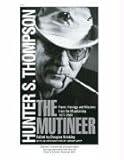 Quite a lot of sub-par material has been published in order to satiate the ravenous demand for Hunter S. Thompson’s writing. Thompson’s essays for ESPN in his later years were uneven at best, but fans may find something to like in The Mutineer, which Simon & Schuster says is “The highly anticipated final volume of the previously unpublished letters of Hunter S. Thompson, king of Gonzo journalism and one of the greatest literary figures of our time.” Insofar as HST,in his latter years, may have been more entertaining and lucid in his letters, this may put The Mutineer slightly above the low bar set by other recent HST collections. On the other hand, the book is edited by Johnny Depp, implying that the book is more about venerating the cult of HST than unearthing new work on par with his best efforts.
Quite a lot of sub-par material has been published in order to satiate the ravenous demand for Hunter S. Thompson’s writing. Thompson’s essays for ESPN in his later years were uneven at best, but fans may find something to like in The Mutineer, which Simon & Schuster says is “The highly anticipated final volume of the previously unpublished letters of Hunter S. Thompson, king of Gonzo journalism and one of the greatest literary figures of our time.” Insofar as HST,in his latter years, may have been more entertaining and lucid in his letters, this may put The Mutineer slightly above the low bar set by other recent HST collections. On the other hand, the book is edited by Johnny Depp, implying that the book is more about venerating the cult of HST than unearthing new work on par with his best efforts.
 November will bring the publication of Michael Lewis’ much anticipated chronicle of the financial crisis, The Big Short. In October last year, when economic uncertainty was at its height and fears were voiced in some rarefied quarters about the possibility of some sort of structural collapse, we wrote, “The world needs an exhaustive look at what happened in 2008 and why.” There have already been several books about the collapse and what caused it, from The Two Trillion Dollar Meltdown to The Return of Depression Economics and the Crisis of 2008, but many readers have been waiting for a book by Lewis, both because of his long history writing about Wall Street’s excesses and because of the powerful essay he penned on the topic for Portfolio magazine in November. Some readers may be weary of the topic by the time the book comes out, but it’s sure to garner some interest.
November will bring the publication of Michael Lewis’ much anticipated chronicle of the financial crisis, The Big Short. In October last year, when economic uncertainty was at its height and fears were voiced in some rarefied quarters about the possibility of some sort of structural collapse, we wrote, “The world needs an exhaustive look at what happened in 2008 and why.” There have already been several books about the collapse and what caused it, from The Two Trillion Dollar Meltdown to The Return of Depression Economics and the Crisis of 2008, but many readers have been waiting for a book by Lewis, both because of his long history writing about Wall Street’s excesses and because of the powerful essay he penned on the topic for Portfolio magazine in November. Some readers may be weary of the topic by the time the book comes out, but it’s sure to garner some interest.
The great Philip Roth keeps churning out new novels. This year’s offering is The Humbling, Roth’s 30th novel. The publisher copy says “Everything is over for Simon Axler, the protagonist of Philip Roth’s startling new book. One of the leading American stage actors of his generation, now in his sixties, he has lost his magic, his talent, and his assurance.” The NY Times reported that yet another Roth novel, Nemesis, is due in 2010.
Jonathan Safran Foer will have a non-fiction book out in November called Eating Animals, which most are guessing focuses on vegetarianism. An interview with Foer at Penguin’s UK website would seem to confirm this. It doesn’t mention the book, but the introduction says “Jonathan Safran Foer on why he doesn’t eat anything with parents.”
Millions reader Laurie points us to My Bird by Fariba Vafi, translated from Farsi and originally published in Iran in 2002. The publisher Syracuse University Press says: “The narrator, a housewife and young mother living in a low-income neighborhood in [modern] Tehran…[is] forced to raise [her] children alone and care for her ailing mother… One of the most acclaimed and best-selling contemporary Iranian writers.” Laurie adds, “The novel won several literary awards in Iran and, according to a 2005 article in the New York Times, Vafi never attended college and writes when her children are in school.”
2010: Probably the most anticipated book of next year will be the The Pale King, a coda to David Foster Wallace’s sadly shortened life as a writer. We already know a fair amount about the book – it will center on an IRS agent – and three excerpts have been published already, “Good People” and “Wiggle Room” in The New Yorker and “The Compliance Branch” (pdf) in Harper’s. A piece by D.T. Max went into some detail about The Pale King following DFW’s death. Given the amount work that lies ahead for DFW’s editors, this may be a second half of 2010 release.
Also possibly arriving in the second half of 2010 is Jonathan Franzen’s Freedom, which we are just beginning to hear about. The book is the long-awaited follow-up to Franzen’s loved, hated, celebrated, Oprah-snubbing novel of nearly a decade ago, The Corrections. Franzen has been coy about the title – the book is reportedly called Freedom – but readers got a taste of what Franzen has in store in “Good Neighbors,” an excerpt that was published in the New Yorker a few weeks ago.
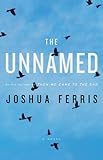 Joshua Ferris will follow up his blockbuster debut Then We Came to the End with The Unnamed. The Book Case writes, “The novel focuses on Tim and Jane Farnsworth, a long-married couple who seem to have it all. But Tim has twice battled a bizarre, inexplicable illness.” Beattie’s Book Blog mentions that the illness is that he “can’t stop walking.”
Joshua Ferris will follow up his blockbuster debut Then We Came to the End with The Unnamed. The Book Case writes, “The novel focuses on Tim and Jane Farnsworth, a long-married couple who seem to have it all. But Tim has twice battled a bizarre, inexplicable illness.” Beattie’s Book Blog mentions that the illness is that he “can’t stop walking.”
John McPhee has a new book due out called Silk Parachute. McPhee wrote a 1997 Shouts & Murmurs piece called “Silk Parachute” about his elderly mother. It begins “When your mother is ninety-nine years old, you have so many memories of her that they tend to overlap, intermingle, and blur.”
Time Out NY says Sam Lipsyte’s The Ask is about “Milo, a New York father who is on the brink of economic ruin, and covers themes including but not limited to ‘work, war, sex, class, race, child-rearing, romantic comedies, Benjamin Franklin, cooking shows on death row, the old-model brain, the commercialization of sadness and the eroticization of chicken wire.'”
British publisher Faber says Rachel Cusk’s The Bradshaw Variations “is a powerful novel about how our choices and our loves and the family life we build will always be an echo – a variation – of a theme played out in our own childhood.”
In the comments or on your own blogs, let us know what books you’re looking forward to.














